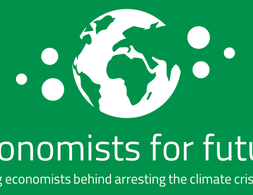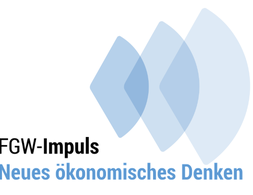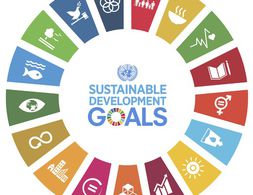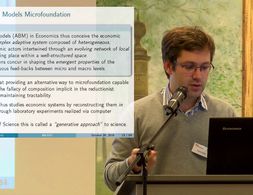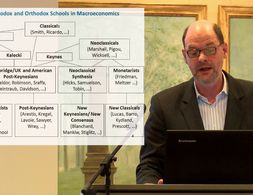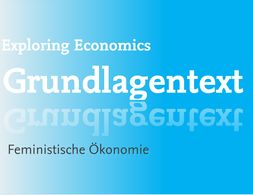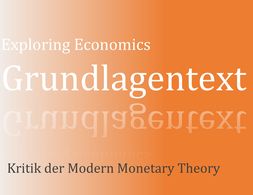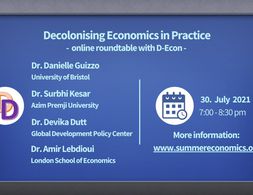137 Ergebnisse
An essay of the writing workshop on contemporary issues in the field of Nigerian economics: Labour and all the dynamics, such as laws, mobility, gender participation, regulation etc., that are associated with it cements the need for this paper which seeks to objectively review, analyse, and if deemed necessary, give plausible recommendations.
Der Umbau zu einer nachhaltigen, CO2-armen und solidarischen Ökonomie erfordert besonders in der Transformationsphase massive Investitionen sowohl in Institutionen und Infrastrukturen, die ein sozial gerechtes Leben für alle ermöglichen (ökologische Landwirtschaft, dezentrale erneuerbare Energien, ökologisches Wohnen, kollektive Mobilität etc.) als auch in Projekte zur Anpassung an und Entschärfung von Klimawandel und ökologischen Zerstörungen sowie finanzielle Transfers vom globalen Norden in den globalen Süden, die aus der historisch angehäuften Klimaschuld folgen.
In der Studie werden Lehrbücher zur Einführung in die Mikro- und Makroökonomie an deutschen Hochschulen untersucht.
The notion that the demand and supply side are independent is a key feature of textbook undergraduate economics and of modern macroeconomic models. Economic output is thought to be constrained by the productive capabilities of the economy - the ‘supply-side' - through technology, demographics and capital investment. In the short run a boost in demand may increase GDP and employment due to frictions such as sticky wages, but over the long-term successive rises in demand without corresponding improvements on the supply side can only create inflation as the economy reaches capacity. In this post I will explore the alternative idea of demand-led growth, where an increase in demand can translate into long-run supply side gains. This theory is most commonly associated with post-Keynesian economics, though it has been increasingly recognised in the mainstream literature.
One method of economic modelling that has become increasingly popular in academia, government and the private sector is Agent Based Models, or ABM. These simulate the actions and interactions of thousands or even millions of people to try to understand the economy – for this reason ABM was once described to me as being “like Sim City without the graphics”. One advantage of ABM is that it is flexible, since you can choose how many agents there are (an agent just means some kind of 'economic decision maker' like a firm, consumer, worker or government); how they behave (do they use complicated or simple rules to make decisions?); as well as the environment they act in, then just run the simulation and see what happens as they interact over time.
A historical glimpse of how economists of the 19th century debated the usefulness of mathematics to economics
The general idea of a Job Guarantee (JG) is that the government offers employment to everybody ready, willing and able to work for a living wage in the last instance as an Employer of Last Resort. The concept tackles societal needs that are not satisfied by market forces and the systemic characteristic of unemployment in capitalist societies. Being a central part of the Modern Monetary Theory (MMT), attention for the JG concept rose in recent years.
The global financial crisis (GFC) led to increasing distrust in economic research and the economics profession, in the process of which the current state of economics and economic education in particular were heavily criticized. Against this background we conducted a study with undergraduate students of economics in order to capture their view of economic education.
Der Beitrag befasst sich mit der Schaffung finanztheoretischer Rahmenbedingungen hinsichtlich einer sozial-ökologischen Transformation der heutigen Wirtschaftsweise durch gezielt-effiziente Anpassung der Geschäftstätigkeit des globalen Bankensektors unter Betrachtung der resultierenden Folgewirkungen zwecks hinreichender Zielerfüllung im Sinne des Pariser Abkommens.
Wie erfüllen und finanzieren wir die Ziele des Pariser Abkommen / Climate Agreement (Social Development Goals (SDG) & Environmental Social Governance (ESG)) in nur noch 30 Jahren? Eine mögliche Antwort.
Antoine Godin gives a bright, illustrated, introduction to agent-based, stock-flow-consistent modeling, with a clear focus on the agent-based aspect.
This lecture by Prof. Dr. Eckhard Hein is part of the Introductory Lectures on Heterodox Economics at the 20th FMM Conference in 2016. It gives a good overview about where Post-Keynesian Economics can be located and what it is all about.
The objective of the course is to explore the main strengths and weaknesses of orthodox and heterodox paradigms within development economics.
Stratification economics is defined as a systemic and empirically grounded approach to addressing intergroup inequality. Stratification economics integrates economics, sociology and social psychology to distinctively analyze inequality across groups that are socially differentiated, be it by race, ethnicity, gender, caste, sexuality, religion or any other social differentiation.
This article demonstrates Schumpeter s propagated approach to monetary analysis in macroeconomics so as to provide for a better understanding of the relation between finance and growth Peter Bofinger Lisa Geißendörfer Thomas Haas Fabian Mayer voxEU
In the pluralist showcase series by Rethinking Economics, Cahal Moran explores non-mainstream ideas in economics and how they are useful for explaining, understanding and predicting things in economics.
Bei der feministischen Ökonomie geht es darum, den unbezahlten Teil der Ökonomie sichtbar zu machen und die Geschlechterblindheit von ökonomischen Prozessen aufzudecken. Entstanden ist diese Theorierichtung in den 1960er Jahren, wobei die Wurzeln bis ins 19 Jahrhundert zurück reichen. Zu Beginn setzten sich die Feministen und Feministinnen vor allem für das Erreichen des Frauenwahlrechtes, für den Zugang zur Bildung und der Abschaffung der Vernunftehe ein. Die Gleichberechtigung von Mann und Frau war in der zweiten Welle des Feminismus zu finden. Bis heute gibt es zwischen Männern und Frauen Unterschiede, welche durch den Feminismus versucht werden aufzudecken und zu beseitigen. Zum Beispiel die Care-Arbeit, den Gender-Wage-Gap, keine Berücksichtigung in ökonomischen Modellen, etc.
This course will fundamentally ask whether we can, or even should use the word ‘decolonising’ in our pursuit of a better economics?
Feminist economics focuses on the interdependencies of gender relations and the economy. Care work and the partly non-market mediated reproduction sphere are particularly emphasised by feminist economics.
Der Fokus der Verhaltensökonomik liegt auf dem beobachtbaren Verhalten von Menschen und deren Entscheidungen.
Along with addressing core conceptual issues in defining heterodox economics, we will cover in some detail five heterodox traditions in economics: Marxian Economics, Institutional Economics, Post-Keynesian Economics, Feminist Economics, and Ecologi-cal Economics. In the first class meeting, we discuss the structure and goals of the course, as well as the expectations and requirements from the students. In addition, we will discuss the concept of heterodoxy in economics, along with discussing the concepts and key issues in mainstream and neoclassical economics.
Jeden Freitag streiken weltweit Schüler/innen für unsere Zukunft. Sie fordern radikale Maßnahmen für die Einhaltung des Pariser Klimaabkommens ein. In diesem Seminar werden wir uns aus der Perspektive der ökologischen Ökonomie mit ihrer Kritik auseinandersetzen. Im Fokus stehen dabei Ansätze einer Postwachstumsökonomie.
Der Fokus der Ökologischen Ökonomik ergibt sich aus der Einsicht, dass wirtschaftliche Aktivität mit absoluten Grenzen konfrontiert ist. Somit werden Wechselwirkungen zwischen Wirtschaft, Gesellschaft und natürlicher Umwelt analysiert, mit dem Ziel einer Transformation hin zu (mehr) Nachhaltigkeit.
In aufgeheizten Zeiten mit noch aufgeheizteren Debatten lohnt es sich manchmal, einen Schritt zurückzutreten, um die Dinge grundsätzlich zu betrachten und nüchtern zu analysieren. Wenn man das bei dem seit November andauernden Streit über die Haushaltspolitik der Bundesregierung tut, kommt man zu einigen spannenden Erkenntnissen, erklären Jonas Plattner und Chiara Rohlfs in der Agora42 Kolumne.
In diesem Beitrag diskutiert Ingo Stützle die Modern Monetary Theory (MMT) kritisch aus einer an Marx orientierten Ökonomiekritik. Dabei wird argumentiert, dass die MMT zwar wichtige Fragen aufwirft, aber weder einen adäquaten Begriff von Geld noch von Kapitalismus hat, was mitunter zu Fehlschlüssen führt. Dabei ist der wesentliche Punkt, dass die MMT auf der Basis eines falschen Verständnisses von Geld die notwendige Begrenztheit staatlicher Verfügungs- und Gestaltungsmacht im Kapitalismus nicht versteht.
Recent events such as the Black Lives Matter protests the the murder of George Floyd in Minneapolis US and the toppling of the statue of Edward Colston in Bristol UK have exposed existing racism colonialism and sexism in our society and in Economics While calls to improve diversity in Economics …
Photo by Anne Nygård on Unsplash In this course you will learn all of the major principles of microeconomics normally taught in a quarter or semester course to college undergraduates or MBA students Perhaps more importantly you will also learn how to apply these principles to a wide variety of …
Understanding the financial crisis from four very different economic theories: Social Economics, Institutional Economics, Post Keynesian economics.
After completing the module, participants should have gained a basic understanding of the economic school of thought referred to as "Modern Monetary Theory" and should be able to analyze the monetary processes at play in the economy and evaluate fiscal and monetary policy decisions from an MMT-perspective.
Aim of this intensive workshop is 1.) to introduce the participants to the macroeconomic workings of the climate crisis as the background of sustainable finance; 2.) to introduce financial assets with ESG (Environmental, Social and Governance) criteria attached to them and their markets and important institutional players; 3.) to provide a critical perspective on the current setup of sustainable finance; 4.) and to work on in-depth case studies illustrating the workings on ESG-finance markets, its emitters and traders as well as their macroeconomic implications.
This syllabus provides an overview of the contents of the course "The Philosophy and Methodology of Economics" at the Duke University
Who are the 86 laureates of the economics “Nobel prize”, and what are their scientific contributions? This course will present the major concepts, theories, and results in modern economics, through an overview of the work of a selection of economics “Nobel prize” as well as Leontief prize laureates.
Why is money more valuable than the paper on which it is printed Monetarists link the value of money to its supply and demand believing the latter depends on the total value of the commodities it circulates According to Prabhat Patnaik this logic is flawed In his view in any …
Wir nutzen Cookies. Klicke auf "Akzeptieren" um uns dabei zu helfen, Exploring Economics immer besser zu machen!


